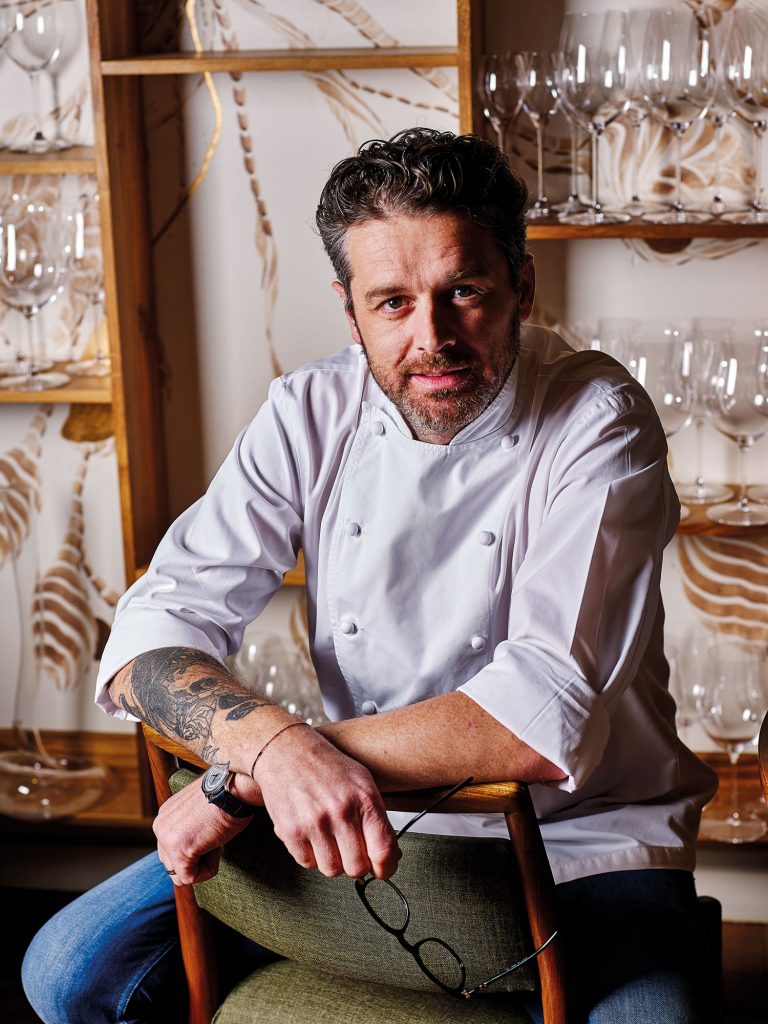How a Scottish chef is creating a new cuisine using ancient ingredients.
One of the Australia’s most influential restaurants is found at the end of a nondescript set of stairs. You’ll find them clinging to the red bricks outside an old Victorian building in the east end of Adelaide’s Rundle Street where the cafés, old pubs and cool fashion salons feather out into Colonel Light’s vast parklands. The door opens and you’re enveloped in the world of Orana. It is within these walls that scores of indigenous ingredients were first introduced to modern fine dining. It is here that a conversation between the First Australians and contemporary Australia is being nurtured through indigenous food production and the development of a new national food narrative. Orana is as much a place of ideas as it is a smooth, cool and comfortable dining room. All that deep thinking, research and development, however, simmers below the surface allowing Orana to simply be a place to eat some extraordinary food and drink some excellent wine.
Its driving force is the enigmatic Jock Zonfrillo. His Scottish burr is slightly disarming in a chef who has embraced and nuanced Australian bush food to help make a new national cuisine. He was born in Glasgow to Italian and Scottish parents. His journey to the centre of Australia started when he met an indigenous man at Circular Quay some 20 years ago. ‘We started talking,’ says Jock, ‘and I knew then that I had to discover the country he was talking about for myself.’ Jock was on a journey of discovery after a spell working with legendary chef Marco Pierre White in London. White had been the saving grace of Jock. Addicted to drugs and sacked from his job, a dishevelled Jock landed unannounced on White’s restaurant door asking for a job. ‘I swear he literally looked into my chest and grabbed my soul,’ said Jock in a recent interview. After his first Australian jaunt, when he worked at Sydney’s Restaurant 41, Jock returned to the UK and worked his way through the ranks of highly regarded restaurants. The call from Downunder grew louder and in 2000 Jock returned, eventually moving to Adelaide where he transformed the restaurant at Magill Estate into a dining destination. In 2013 Jock opened Orana. The critics who appreciated his trailblazing philosophy applauded loudly. Others disparaged his chef-as-auteur style of service.
Orana’s dining room is Scandi sparse, natural light flooding the honey-coloured parquetry in early evening. Fine stemware and hand-glazed plates sit on the bare, native hardwood tables, their legs deliberately burnished by fire. Jock has brought the outback inside. A lump of dough sits under a glass cloche which reveals a cloud of the sweet aroma of ferment when lifted by the waiter. It’s then whisked to the kitchen, baked and returned later on coals as our bread, in this case potato damper served with smoked macadamia butter which carries the tang of native thyme. The meal begins light but heavy with expectation, building rapidly like soft rain before a storm. A frond-like tentacle of baby octopus christened with dry-aged beef fat, paired with a clean snap of native karkalla (pigface). Beautiful little Spencer Gulf prawns follow, their flesh just set, the dust of Davidson plum a sharp and heady note.
This is followed by the most beautiful golden broth made with porcini picked in the Adelaide Hills (talk about umami!) then a pancetta, potato and pepper pie served inside an exquisitely polished, fine, hollow branch. The leitmotif of the Australian bush repeats again and again throughout the meal.
Jock has changed the way Adelaidians eat. A few years back he teamed up with local farmer, butcher and businessman Richard Gunner, spurring him on to grow some really tasty beef. Gunner responded by importing a rare British beef breed, English Longhorn. Together they went up to Darwin and worked with the Larrakia people to hunt wild magpie geese that were feasting on mango farmers’ fruit. A side project also saw them bring in green ants as an ingredient. Jock’s understanding of indigenous foods and the cultures that use them have made him not just a mainstay of culinary festivals but also the star of his own cable TV series about indigenous food around the world.
For the record the green ants have a clean, citric tang and make a perfect foil to the subtle earthiness of Coorong mullet. The magpie goose has been dry aged and has a wonderful gamey flavour, the meatiness a match for the intensity of bush tomato lightened by the crisp crunch of fresh lilly pilly. The smoky tang of campfire precedes a large, fat flathead, cooked in the fire pit and portioned out to that sitting’s lucky diners. There are 18 courses in all, finishing with delicate, almost brittle junket-like sweet buffalo milk in a sauce flavoured with strawberry gum.
There are theatrical flourishes in the service but they are quietly underplayed while the host of classic and modern techniques in the preparation of the food never upstages the starring ingredients. The backstories of the produce are introduced but not entirely revealed. When pushed, staff will tell the full narrative of the ‘ant story’ and the ‘magpie goose story’ without being didactic. Dining at Orana is like exploring the Australian bush itself, sometimes dramatic but underscored by an elusive beauty that reveals itself only when one is ready to open up to it. It is a journey worth taking.
The meal (up to 20 courses, changing according to seasonal produce) costs $175 per person with matching wines a further $150 per person. There is a short 7- to 9-course lunch on Wednesday and Friday for $80, with matched wines an extra $70.
RESTAURANT ORANA
Upper level of 285 Rundle Street, Adelaide, South Australia
Tel 08 8232 3444
restaurantorana.com



Comments are closed.